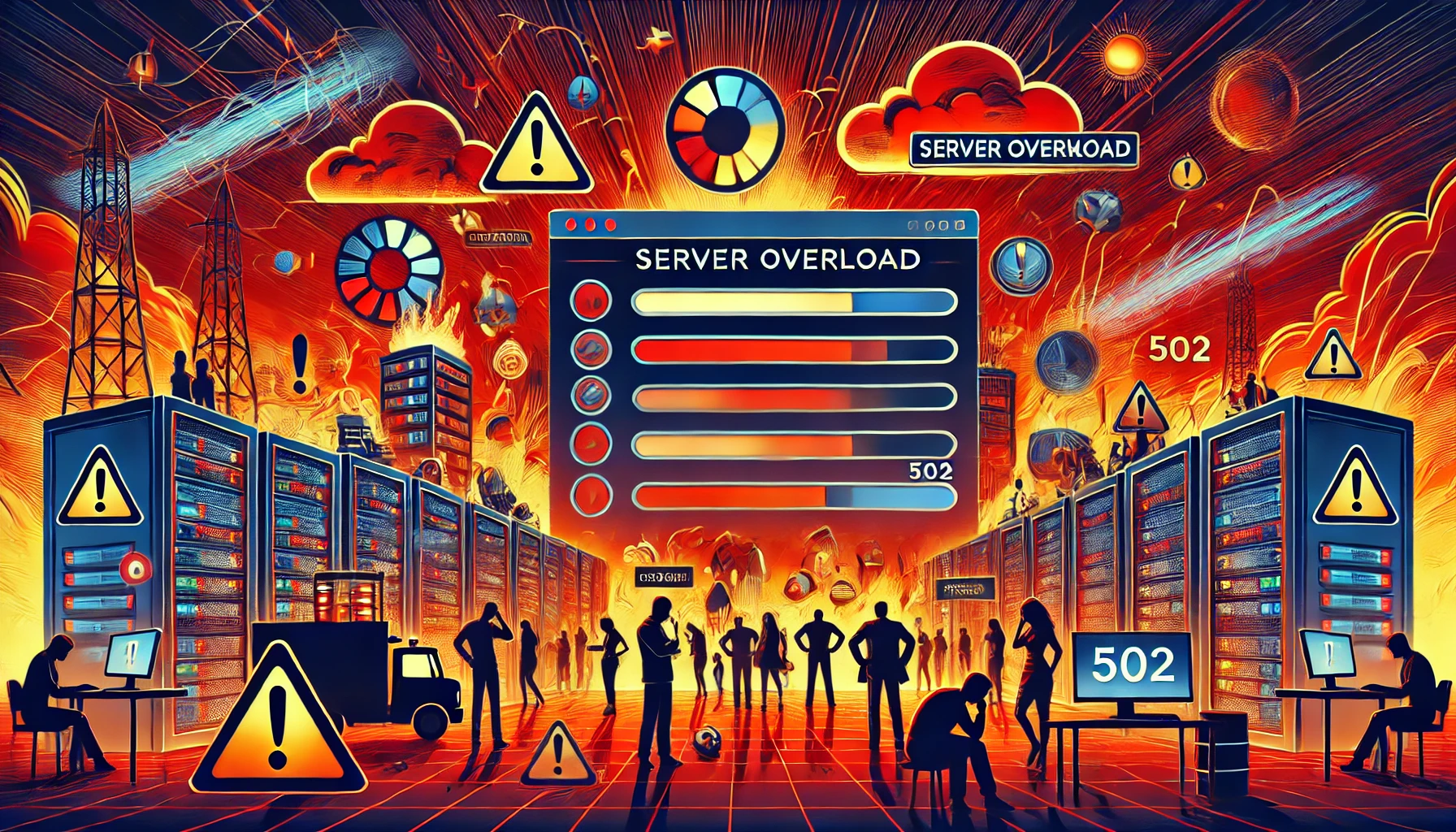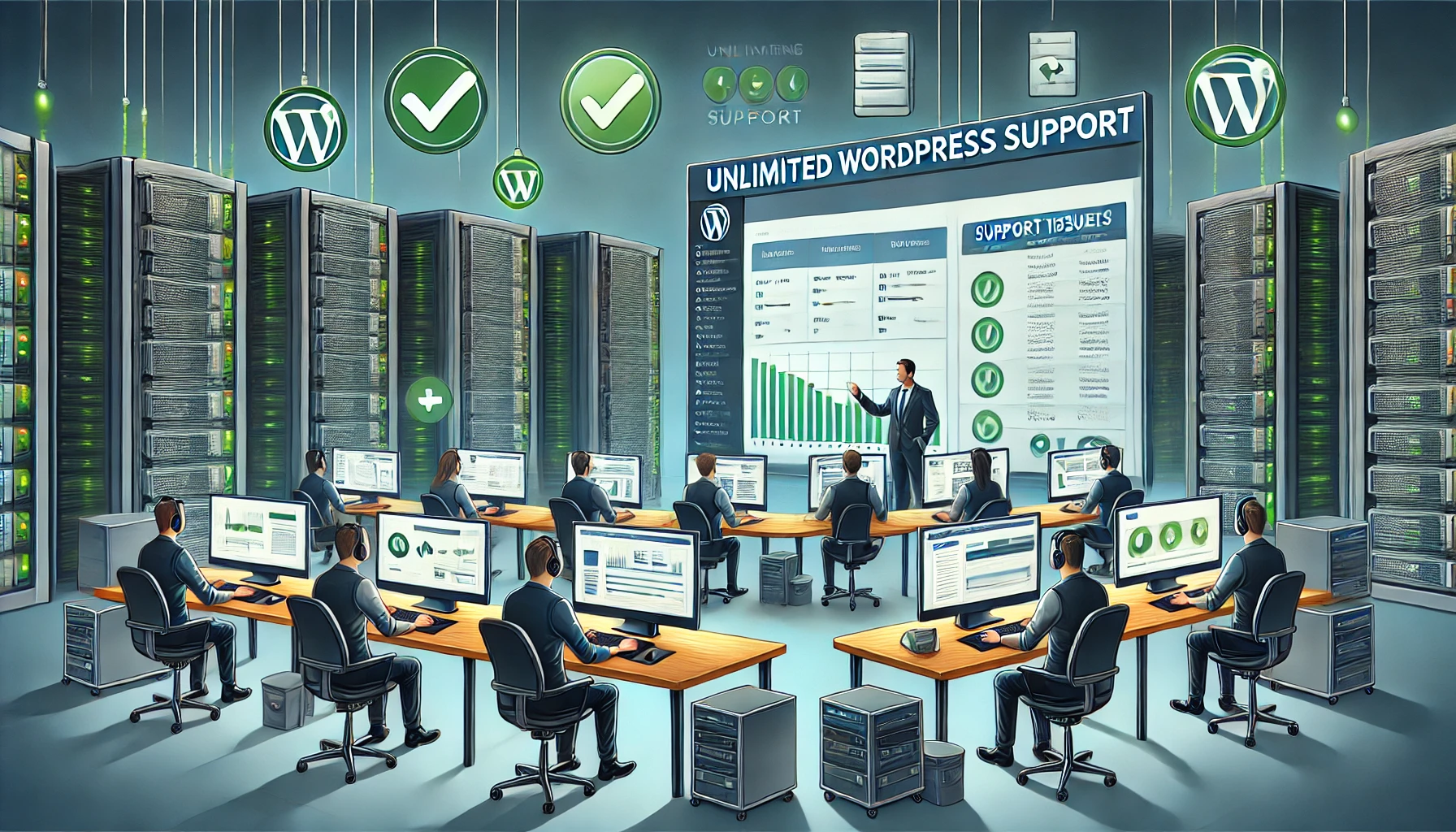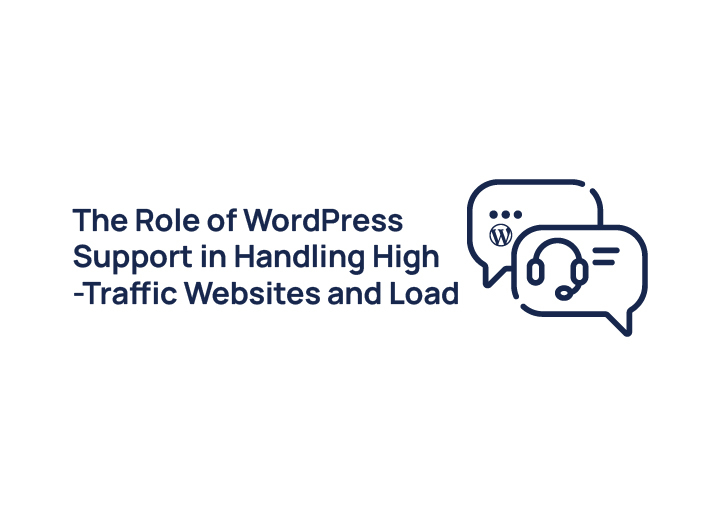When your site gets hit with unexpected traffic spikes or heavy loads, unlimited WordPress support can be a lifesaver. It keeps your site stable and running smoothly, no matter how much traffic you’re dealing with.
With expert help on hand, performance issues are fixed fast, resources are optimized, and downtime is avoided, so you can stay focused on growing your business without worrying about the technical side of things.
Now, sure, how? Let’s read this blog and understand the role of WordPress support in handling high-traffic websites and their load.
Understanding High-traffic WordPress websites and Load

Understanding high-traffic WordPress websites and the load they experience is essential for ensuring optimal performance. As traffic increases, more demands are placed on the website’s resources, including server power, bandwidth, and memory. This can lead to slow loading times or even site crashes if not properly managed.
High-traffic sites often need advanced infrastructure, such as scalable hosting solutions, to dynamically adjust resources during peak periods, ensuring continuous availability and performance.
To effectively handle high-traffic, WordPress sites often implement vertical and horizontal scaling strategies. Vertical scaling increases the power of a single server (CPU, RAM), while horizontal scaling adds additional servers to distribute the traffic load.
In addition, employing strategies like caching, optimizing databases, and using a Content Delivery Network (CDN) significantly reduces server load, improves response times, and enhances overall user experience.
Discover: Top Enterprise WordPress Agencies
The Challenges Of High-Traffic Websites and Load

When visitor numbers surge, high-traffic websites often encounter several challenges, commonly referred to as “hiccups. ” These issues can severely impact the user experience and the overall performance of the site.
- Server Overload: One of the most frequent problems is server overload, where the server becomes overwhelmed by a large number of requests, causing slow load times or complete crashes. Websites must ensure that their infrastructure is capable of scaling to handle these spikes, whether by adding more servers or implementing load-balancing solutions.
- Bottlenecking Complex Requests: Some user requests are more complex than others, such as processing large databases or handling multimedia content. If these requests pile up, they can create bottlenecks, leading to delays and potential crashes
- Security Risks: High traffic can also bring security challenges. Distributed Denial of Service (DDoS) attacks, where malicious users flood the website with fake traffic, can disrupt operations or cause crashes
- Content Delivery Delays: When traffic surges come from different parts of the world, delivering content quickly can become a challenge. Using a Content Delivery Network (CDN) to cache content across multiple servers can help alleviate the load and improve response times for users globally
- Resource Limitations: Websites running on shared hosting plans may hit resource limits such as CPU or RAM caps, causing site outages during traffic peaks. Upgrading to dedicated or cloud hosting solutions can help mitigate these risks by providing more flexible resource allocation.
Is Your WordPress Site Ready to Handle High Traffic without Breaking?
Don’t wait for downtime to take action. Let WPTasks optimize, monitor, and support your site for peak performance, no matter the load.
How Unlimited WordPress Support Can Help Handling High-Traffic Websites

Let’s now see how Unlimited WordPress Support can help handle high-traffic websites and server load:
Real-Time Monitoring of Site Performance
Unlimited WordPress support is a game-changer when it comes to managing site traffic and load spikes. By keeping an eye on your site’s performance in real time, support teams can monitor server metrics, page speeds, and traffic patterns to catch potential problems before they snowball into bigger issues. This ensures your site stays fast and responsive, even during high-traffic periods, giving you peace of mind knowing that any hiccups are addressed immediately.
Performance Optimization Techniques
Unlimited WordPress support also excels in optimizing your site’s performance during traffic spikes. From implementing caching systems and utilizing CDNs to optimizing databases, these services help ensure your site runs smoothly under pressure. Regular audits can identify bottlenecks, while steps like compressing images, tweaking server settings, and optimizing plugins ensure your site loads quickly, no matter how many visitors you get.
Rapid Response to Issues
When traffic surges unexpectedly due to promotions or viral content, it’s vital to have quick response times to avoid slowdowns or crashes. WordPress support services ensure swift action by monitoring unusual spikes and stabilizing the site through resource optimization or load balancing. Even a few minutes of downtime can impact user trust and sales, so having experts on hand to manage these issues is key. Whether you’re a small business or a large enterprise, fast response times are crucial for protecting your site and revenue.
Scaling Resources to Match Traffic Demands
As your site grows, the ability to scale resources quickly is crucial. Unlimited WordPress support helps you adjust server resources to handle high traffic, particularly with flexible cloud hosting. By working with cloud platforms, your site can scale seamlessly during peak periods, ensuring it stays functional and responsive without any technical slowdowns.
Load Balancing Solutions
Load balancing is another essential feature that WordPress support teams use to manage high-traffic periods. By distributing traffic across multiple servers, load balancers prevent any single server from becoming overwhelmed. This not only keeps your site online but also ensures it remains fast and responsive, even during traffic surges. With proactive monitoring and resource allocation, support services ensure that high-traffic moments don’t disrupt your website’s performance.
What to Look for in a WordPress Support Provider
When your website is attracting increasing amounts of web traffic, the stakes get higher. That’s why choosing the right WordPress support provider is essential not just for handling traffic, but for ensuring a seamless, secure, and scalable user experience. Here are the key qualities every website owner should prioritize.
24/7 Support Availability
Website traffic doesn’t follow a schedule, and neither do performance issues. A sudden spike in logged-in users, a plugin malfunction, or an overload on the website’s physical server can occur at any hour. That’s why round-the-clock support is essential.
Look for a provider that offers 24/7 assistance through live chat, phone, or ticketing systems, ensuring your website remains accessible and operational during high-traffic moments like sales campaigns or viral content surges. Immediate access to expert help can prevent downtime and reduce the risk of user frustration or lost revenue when thousands of users visit your site simultaneously.
Performance Expertise
When it comes to WordPress, performance isn’t just about fast page loads; it’s about the entire ecosystem. A quality support provider will deeply understand website optimization techniques that enhance speed and stability. This includes caching strategies, minimizing server load, optimizing database queries, and identifying plugin conflicts.
They’ll also guide you in selecting WordPress hosting plans that match your traffic capacity, helping you avoid bandwidth limitations and resource bottlenecks. Whether you’re using a shared hosting account or a dedicated hosting platform like WP Engine, the right support team can fine-tune your site to handle large volumes of concurrent users without breaking a sweat.
Security Know-How
High web traffic often brings increased visibility but it also increases the risk of cyber threats. A trustworthy WordPress support team must be equipped with strong security knowledge to defend against malware, brute-force login attempts, DDoS attacks, and vulnerabilities in plugins or themes.
They should proactively manage security patches, configure firewalls, and implement malware scanning tools to protect your hosting server. For logged-in users, especially on membership or eCommerce sites, robust user authentication and data encryption are essential. With security threats evolving rapidly, your provider should also stay current with best practices tailored to your specific hosting service or platform.
Hosting Resource Optimization
A skilled WordPress support provider goes beyond surface-level fixes by helping you get the most from your hosting resources. They work closely with your hosting service to ensure memory, CPU, storage, and bandwidth allocations are sufficient for your growing needs.
If you’re operating on a basic hosting account with limited scalability, they may recommend upgrading to a more powerful solution, like a VPS, cloud environment, or entire server setup. This is especially important during traffic spikes when your hosting server needs to handle more requests than usual. With expert tuning, your website can remain fast and responsive even when under load.
Conclusion
In conclusion, site load refers to how quickly your website loads, while traffic spikes are sudden surges in the number of visitors. Both can greatly affect your site’s performance and user experience if not managed properly. This is where WordPress support comes in, providing the expert assistance needed to maintain site stability and optimize performance.
When faced with challenges like slow loading times, crashes, or potential revenue loss due to high traffic, WordPress support services can be invaluable. They help mitigate these risks by ensuring your site remains responsive and functional, allowing businesses to focus on growth without worrying about technical disruptions.
Some Asked Questions
Yes, WordPress can handle high traffic, but it depends on your hosting provider and setup. A reliable hosting provider offering managed WordPress hosting or a dedicated server is ideal for handling heavy traffic. Avoid basic web hosting if you’re expecting high traffic volume or peak traffic. Use a caching plugin like WP Super Cache and optimize your media files and database queries to improve performance and manage traffic flow better.
WordPress is a content management system that helps site owners easily build and manage websites whether for blogs, business sites, or shopping online. It’s flexible, beginner-friendly, and supports a wide range of WordPress themes, plugins, and hosting environments.
To boost site speed, use a lightweight WordPress theme, a good caching plugin, and image optimization tools. Choose a managed hosting plan or a dedicated server hosting setup if you’re experiencing traffic challenges. Limit simultaneous database connections, reduce media files, and use query caching to ease your web server load.
Focus on quality content, SEO, and performance. Use a reliable hosting provider to ensure uptime and fast load times. Promote on social media, optimize your site for mobile, and consider email marketing. Upgrading to a better hosting plan’s bandwidth or switching to Google Cloud can help you manage actual traffic growth and avoid issues from too much traffic.


